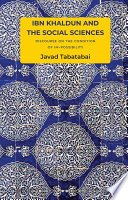

Most ebook files are in PDF format, so you can easily read them using various software such as Foxit Reader or directly on the Google Chrome browser.
Some ebook files are released by publishers in other formats such as .awz, .mobi, .epub, .fb2, etc. You may need to install specific software to read these formats on mobile/PC, such as Calibre.
Please read the tutorial at this link: https://ebookbell.com/faq
We offer FREE conversion to the popular formats you request; however, this may take some time. Therefore, right after payment, please email us, and we will try to provide the service as quickly as possible.
For some exceptional file formats or broken links (if any), please refrain from opening any disputes. Instead, email us first, and we will try to assist within a maximum of 6 hours.
EbookBell Team

4.7
76 reviewsCharting a different path, Javad Tabatabai’s highly original Ibn Khaldun and the Social Sciences is an inquiry into the condition of the im-possibility of the social sciences in the Islamic-Aristotelian paradigm. Rather than identifying the science of culture as a forerunner of, or alternative to, sociology, it investigates the Prolegomena within the epistemological framework established by the social sciences. Javad Tabatabai theorizes the condition of im-possibility of the ‘scientific revolution’ as the ‘epistemic obstacle’ to modernity in Islamic civilization. This theorization revisits Michel Foucault’s discussion of the condition of possibility of the human sciences in light of the history of Christian-Aristotelian thought and the broader French debates about epistemology from Bachelard to Althusser.
Ibn Khaldun and the Social Science offers a critical theory of tradition and modernity in the Middle East, elaborating on a historical situation where social and human sciences emerged by the way of colonial and post-colonial translations of discourse from Europe, and in a historical and epistemological break with inherited traditions of knowledge. In this situation, Tabatabai highlights the significance of reactivating Ibn Khaldun’s critical reckoning with the limit of inherited traditions as the political-theological horizon of renewal.